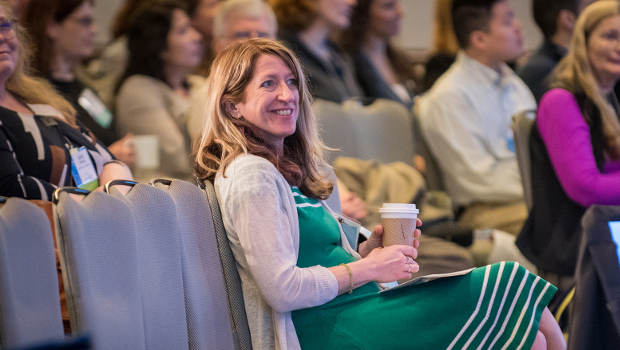HCSRN 2017: Turning know-how into hope for health care

Inspired by the Health Care Systems Research Network annual meeting, Sarah Greene reflects on why the group’s research is needed now more than ever.
by Sarah Greene, MPH, executive director of the Health Care Systems Research Network
Planning a conference is never easy. But it’s always a learning experience. As the executive director of the Health Care Systems Research Network (HCSRN), I had the honor of planning the Network’s 2017 annual meeting, which drew nearly 400 people to San Diego last month. What did I learn from our attendees’ post-conference feedback? You can never have too much coffee.
I’m grateful to have at least one easy request to fulfill next year. Because in our nation’s volatile political climate, the challenges we face as health care researchers seem more daunting than ever. Uncertainty about the future of the Affordable Care Act (ACA) coupled with the threat of dramatic cuts to federal research funding were topics that loomed large at this year’s conference. Nonetheless, I came away feeling hopeful.
Why? Because now, more than ever, our nation needs the answers that HCSRN research can discover.
Finding solutions for the real world
In 2010, at the Network’s annual meeting in Austin, I huddled with other conference attendees to watch history being made as the ACA was signed into law. In contrast this year, the fate of the ACA was hanging in the balance of a contentious Congressional vote scheduled to take place the next day.
That the vote didn’t happen in March is old news by now. But what’s as apparent as ever is that Congress needs to find solutions that will improve access, cut costs, and create better health for all.
That’s where the HCSRN’s unique brand of practical research comes in. As sophisticated research centers based in health systems across the country, we are uniquely positioned to find solutions that work in the real world. We know how to do research in ways that speed the translation of findings into clinical practice. We know how to make implementation work. And we know how to study and learn from our efforts along the way.
A compelling example was our panel on “Partnering with the Delivery System on Data Use.” Five different systems discussed their use of our data resources on varied efforts including suicide prevention, guiding appropriate cancer treatment, and identifying target populations for any type of improvement activity deemed important to the health system. Another panel centered on lessons learned from so-called “pragmatic” trials, which are intentionally embedded in the clinical operations of a system.
Focusing on the “how” instead of the “what”
This theme of “knowing how” came to bear on this year’s conference long before the recent debates about the ACA hit the Congressional stage. It started when our conference planning team decided to take a novel approach to our scientific agenda. Inspired by our committee chair, Hal Luft — an HCSRN board member and director of the Palo Alto Medical Foundation Research Institute — we decided to focus our oral sessions on the “how” of our science instead of the “what.”
Hal reasoned that the “what” — that is, the results of our studies — could be presented at a variety of research conferences, such as the AcademyHealth Annual Research Meeting or any number of clinical society meetings. But no venue exists to share methods, approaches, and insights derived from doing research in our health systems. So we decided to accept study results as posters, and seek panel presentations to dive into how the results were achieved.
It was a big departure, and despite my anxiety throughout our call for submissions, our experiment was generally well-received.
Along with 120 posters, we held 35 panel presentations on topics like creative uses of data and effective approaches to working with partners — from patients and families to clinicians and system leaders. I was particularly impressed by the diverse approaches that our research centers are taking to engage with front-line clinicians. This is where the HCSRN can continue to blaze trails. Physicians, nurses, pharmacists, and other practitioners are instrumental to many of our research studies, and we can capitalize on our relationships for more relevant and responsive research.
Forging ahead despite uncertainty
It’s impossible to predict what the research-funding landscape will look like by the time the Network gathers for our 24th annual meeting in Minneapolis next year. Funders such as the Agency for Healthcare Research and Quality and the Patient-Centered Outcomes Research Institute are vulnerable to deep cuts or worse. The National Institutes of Health may see its budget slashed by 20 percent. This is not good news for health care or health care research.
But rather than feeling discouraged, the HCSRN governing board urged us to forge ahead and stay focused on how our Network is uniquely suited to be the voice for learning health systems in the U.S. The experience and tenacity of our 1,900 research staff are among our greatest strengths. And we’ll keep finding new ways to turn our research know-how into hope for our nation’s health care system.
Learn more about Kaiser Permanente Washington Health Research Institute. Sign up for our free monthly newsletter.


